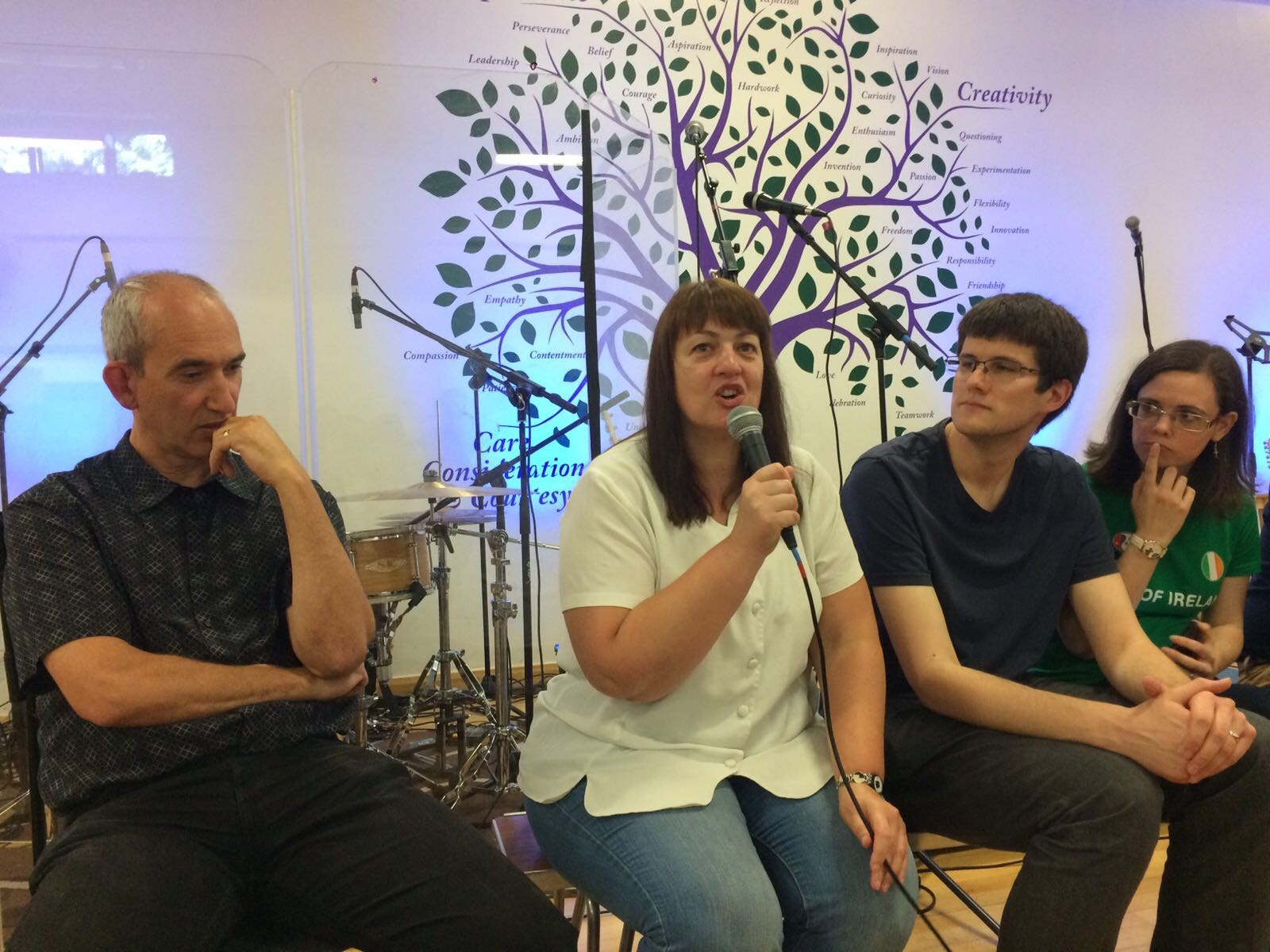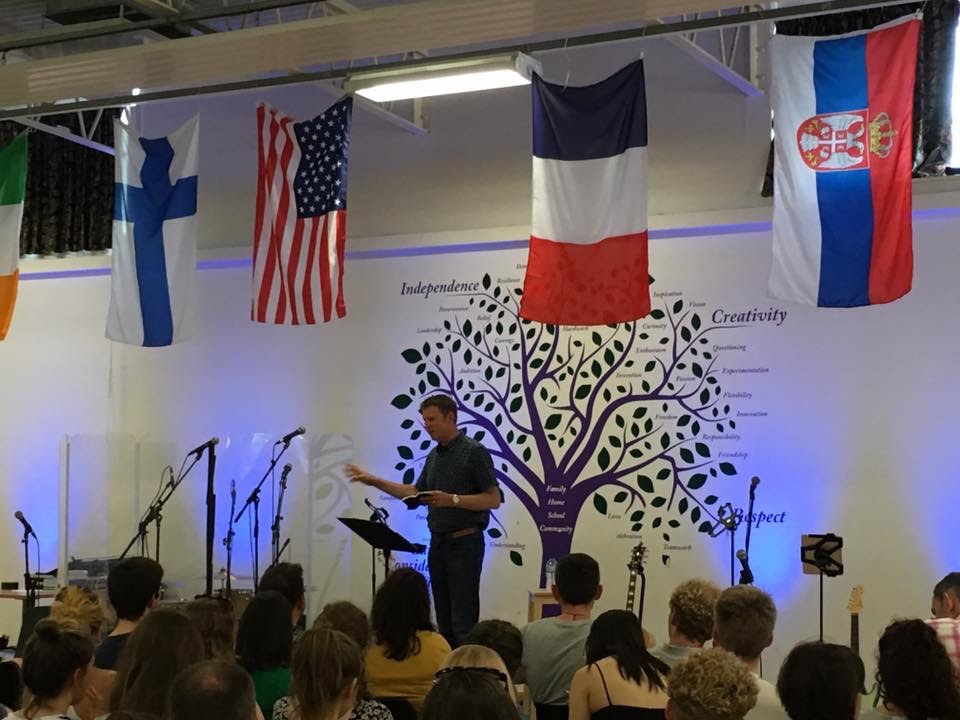
HUGH'S BLOG
HOW WE DECIDE WHAT TO PREACH
HOW WE DECIDE WHAT TO PREACH
We sometimes get asked how we decide what to preach on at Redeemer. This is a general overview of he head, heart and hands (persuasion/ passion and practicalities) of how sermon series are decided upon at Redeemer..
HOW WE DECIDE WHAT TO PREACH
We sometimes get asked how we decide what to preach on at Redeemer. This is a general overview of he head, heart and hands (persuasion/ passion and practicalities) of how sermon series are decided upon at Redeemer.
PERSUASION & PASSION
We believe there are numerous styles/methods that can be used to preach and decide upon preaching series – there seems no biblically restrictive guideline on WHAT to preach when, and HOW to do it. The Bible reflects a variety of methods. One essential factor is to aim to ‘preach the whole counsel of God’ (Acts 20:27) in some way. For us that means ensuring a balance of topics and styles (e.g. exegetical, topical, character led).
Regarding what it means to ‘preach the whole counsel of God’, D. A. Carson is very helpful; (http://thegospelcoalition.org/blogs/justintaylor/2007/11/20/preaching-whole-counsel-of-god/)
When Paul attests that this is what he proclaimed to the believers in Ephesus, the Ephesian elders to whom he makes this bold asseveration know full well that he had managed this remarkable feat in only two and a half years. In other words, whatever else Paul did, he certainly did not manage to go through every verse of the Old Testament, line by line, with full-bore explanation. He simply did not have time. What he must mean is that he taught the burden of the whole of God’s revelation, the balance of things, leaving nothing out that was of primary importance, never ducking the hard bits, helping believers to grasp the whole counsel of God that they themselves would become better equipped to read their Bibles intelligently, comprehensively. It embraced
- God’s purposes in the history of redemption (truths to be believed and a God to be worshiped),
- an unpacking of human origin, fall, redemption, and destiny (a worldview that shapes all human understanding and a Saviour without whom there is no hope),
- the conduct expected of God’s people (commandments to be obeyed and wisdom to be pursued, both in our individual existence and in the community of the people of God), and
- the pledges of transforming power both in this life and in the life to come (promises to be trusted and hope to be anticipated).
PRACTICALITIES & EXPECTATIONS
Practically then at Redeemer, the elders are primarily responsible for forming and preparing the sermon series and preachers. We have 4 guiding reasons why we pick a series. These are helpful guidelines for us, and not restrictive rules!
1. Progressive.
When we see the Bible as the ultimate authority we simply choose to work our way through it over the years.
The strength in this means that you will have a balanced diet of topics and will be forced to preach on things you perhaps wouldn't want to. The challenge can be that if there are other things you really feel the church needs to hear about, but aren't covered in your ‘current’ text, you can try and bend scripture to cover it in unhelpful way.
2. Pragmatic.
This is where the decision is made to preach on a subject in a series because it simply needs to be covered. It is not necessarily that there is a lack in this area, or a particular desire to preach on it from the elders. But in a kind of ‘you need to eat your greens’ family kind of way this approach to a sermon series I think is legitimate. Rick Warren has stated that there are five key elements to a healthy church; worship, fellowship, discipleship, serving, and evangelism. He says to focus on church health not church growth, and systematically makes sure each of these five main areas has a sermon series that preaches into theme every year. The strength of this approach is the producing of a balanced people.
3. Pastoral.
This is when a book or theme is chosen because of a loving concern from the elders. It is driven from an observation of church culture more than a prophetic burden. As overseers we have the privilege and responsibility of observing trends. And so we yearn to see people made aware of potential wrong thinking or wrong behaviour that may be church-wide to some degree. It is more bottom-up driven than top-down driven.
4. Prophetic.
This is very top-down approach i.e. a strong sense from God that he wants to impress something to a greater measure into his church family. It can come from a variety of settings but the overall effect is an unavoidable deep frustration in the heart of the leaders that God has placed there and wants to pour into his church.
GLOBAL SUNDAY - GLOBAL VISION
Global Sunday is a service held by The City Church to celebrate how God has used that particular church to equip and send people across the 'globe' to pioneer gospel advance through starting churches, joining church plants or strengthening existing churches.
Global Sunday is a service held by The City Church to celebrate how God has used that particular church to equip and send people across the 'globe' to pioneer gospel advance through starting churches, joining church plants or strengthening existing churches.
Before moving to Colchester I was based at The City Church for 15 years and was an elder for the last 7 of those years. For the last 3 or 4 years I was responsible for 'church planting' - encouraging, guiding, equipping and helping pioneers 'go'. being at Global Sunday was therefore a great privilege to see the fruit that has come out of that church.
Present on the day were ourselves and the Redeemer gang from Colchester (UK), the Groombridges from Nis (Serbia), the Eatons from Lille (France) and the Sharpes from Dublin (Ireland). All of these families have bent sent by The City Church in the last 3-5 years. Below is a quick list from memory of the places people have moved to from City to pioneer or strengthen churches in the last 15 years - or have moved for other reasons and had a positive impact on where they are) - I will obviously miss some!
- Dublin, Ireland
- Lille, France
- Helsinki, Finland
- Nis, Serbia
- Geneva, Switzerland
- Herne Bay, Whitstable Colchester - UK
- Portsmouth, London, Cambridge, Seaford and more - UK
- Fredericton, Canada
- Christchurch, New Zealand
- Doha, Qatar
- California, USA (this year!)
I am sure the list could go on! Being a part of that was a privilege, and one of the reasons I ended up overseeing church planting was because 'going to the nations' has always been in my blood since my early christian days.
My Background
I didn't grow up in a Christian family and always wanted to follow in my Father's footsteps as a Safari Operator, Game Guide, Professional Hunter...that kind of thing! Somehow God broke into my life and I came to know Jesus as a very real person quite young and in my mid teens I was thrilled by the vision of a church as the 'highest of all mountains' with the 'nations streaming to it' to worship God and find him (Isa 2:2). Ever since then the idea of 'going' and 'planting' has thrilled me. That is why we are in Colchester - God called us and our desires were stirred to 'go again'.
My Longing
In my DNA, in the prophetic words over our church is this 'sending culture', this desire to 'touch the nations'. yes I want to see a large, healthy church in Colchester because that means lots of people are being saved and added! But the thought of being a resourcing, equipping, sending church excites me too! And I believe that is what God has for us...One year into gathering publicly these are the nations that have been represented in our church;
- Oman
- India
- Dubai
- Switzerland
- South Africa
- Zimbabwe
- Malaysia
- Thailand
- China
- UK
Three particular nations we have had the privilege of having people for a short time from, who have then gone back in some way encouraged and equipped;
- South Africa
- Switzerland
- India
We live in a town that has a University with a high percentage of foreign students - you can see why God brought us here and what He is doing! We get, in most cases, three precious years to train, disciple and equip (and be blessed by!) those who will return to nations around the globe! What a starting place?! More Lord!
BUILDING A STRONG SENDING BASE
At Global Sunday I was asked; 'What advice would you give to those considering pioneering?' - I found that an easy question to answer. 'Where possible be part of a strong and stable sending church, where you are known.' The equipping and support from The City Church to Redeemer has been amazing...yes the leaders BUT NOT ONLY THEM. Yes money...but NOT ONLY THAT. The prayers and the people, the friendship and the faith...people REALLY pray for us, people give, people visit, people love. I was met by a gentlemen on Global Sunday who had only been at the church for a few months - we had never met and he arrived long after we had moved - and he greeted me warmly, told me his family had been praying for us, that he felt he knew us. Wow! A few months into being at the church he had been caught up into the church's mission...if you can be part of a church like that, do it! If your church is not quite like that, set about praying for it and fostering that culture and engaging in churches that are more like that. Healthy 'parenting' produces healthy children!
Global Sunday was a shot in the arm and a teaser for what God might have for us! Well done City Church, and Lord - grant us a similar legacy!
Asking the WHY question...
This morning I was reading 1 Kings 1 and was struck by the comment on David's failure to ask his son Adonijah the 'why' question throughout his life.
The placement of that comment seems to suggest that Adonijah's actions were in part due to a lack of that question being asked of him by his father.
This morning I was reading 1 Kings 1 and was struck by the comment on David's failure to ask his son Adonijah the 'why' question throughout his life.
The placement of that comment seems to suggest that Adonijah's actions were in part due to a lack of that question being asked of him by his father.
“5 Now Adonijah the son of Haggith exalted himself, saying, “I will be king.” And he prepared for himself chariots and horsemen, and fifty men to run before him. 6 His father had never at any time displeased him by asking, “Why have you done thus and so?””
I don't want to overstate the suggestion but it got me thinking about my parenting, pastoring, discipling and my friendships. Do I ask the 'why' questions? If not why not? Do I do it skilfully? What are the consequences if I do not? Am I being asked that question - if not why not?! How do i respond when asked that questions...
The Challenge - I think the first thing to note is that it is not normally an easy question to ask or receive. Verse 6 tells us that David had never 'displeased' Adonijah by asking him the 'why' question. Being asked the 'why' question is usually displeasing! At best it makes us realise others are confused by our actions/thoughts and it is not a great 'idea' or we may have it wrong...at worst it reveals wrong/bad motives. Asking the questions isn't easy, being asked isn't either
The Consequence - When we live our lives not being asked the 'why' question do we stop asking it ourselves? Do we increasingly just do what 'we feel like' without developing the habit of asking 'why'? And even if it is just us asking 'why', surely we get blind spots? How many times have you seen earnest people fully convinced in a course of action when nearly everyone around them is shaking their heads and thinking it is foolish? Unless we learn to ask 'why' in a deep and meaningful way, and unless we have others around us asking 'why', I think we are prone to go down a wrong path, be more easily deceived and miss out on greater freedom in our lives.
The Culture - Obviously asking 'why' isn't the only thing we do or say. Encouragement, listening, deepening relationships etc are all key things that create a healthy culture in which the 'why' question is asked. Neither is the 'why' question only to be asked when there is disagreement or confusion - it is a great question to ask simply to learn what is behind a course of action or thinking. It is good to ask 'why'. It is essential to ask why to avoid pain, unnecessary failure and heartbreak.
I am grateful that I was on a leadership team (church) where we met regularly and asked lots of why questions - Why did you say that? Why did that affect you like that? Why did you put it that way? Why weren't you there? As a team we wen through a season of learning to ask, and be asked, that question...it is strange at first and often displeasing! When you learn it comes from a place of love, care and concern it is easier than when you presume it comes from a skeptical point of view! As with everything, it takes time to become 'normal'...learning to drive is awkward, requires new coordination, is filled with worry and is exhausting...but in time it becomes automated, relaxing (ish!) and opens up opportunities. Being asked and asking 'why' is the same...be deliberate and keep going, it becomes easier and you begin to see so much more, avoid pain, make more considered decisions and hopefully avoid going down the path that Adonijah did!
Worldview - I grew up in Zimbabwe and lived there for 20 formative years. The last 16 I have lived in the UK...I am very grateful that I saw life through 'Africa' and now thorough the 'UK' - it makes me realise people think and do things differently, with deep conviction, thinking theirs is the right way...but when you boil it down it isn't simply right or wrong (although can be) - just different! the 'world' we grow up in shapes our thinking a lot...as Christians our thinking is shaped a lot by the world around us, music we listen to, TV we watch...and many ways of thinking are formed in us before we start to really think for ourselves! As 'aliens' in this world, Christians need to ask the 'why' question a lot! Why do I think/do this or that...is it because I am 'gospel shaped' in my thinking or 'culture shaped'. We are all culture shaped more than we realise..asking the 'why' question helps us more and more think and live as 'heavenly citizens'. 'Why' reveals where we are 'earthly' in our thinking and where we are 'heavenly'.
Questions
- Who asks you 'why' questions?
- If no-one why (!) not? Have you taken the time to invest in key relationships?
- How do you respond when asked 'why'?
- Have you pushed people away?
- Are you asking the 'why' questions?
- Remember the goal is to help people not simply point out wrong!
- When reading the Bible do you regularly ask 'how does this impact how I think, view and approach things?'
Ch 3 - Fathering Leaders, Motivating Mission (Book)
'Books' is a variety of blog posts summarising/commenting on books I am reading through - at times chapter by chapter and at other times commenting on the whole book. This will generally be 'light' reading but I hope will help me to distill my own reading - and if of any help to others then great! These posts will be a summary of the book - where I want to add my personal reflections and thoughts I will make that clear! Hopefully this will give you a taster and a link to get the books and work through the issues yourself.
'BOOKS'
'Books' is a variety of blog posts summarising/commenting on books I am reading through - at times chapter by chapter and at other times commenting on the whole book. This will generally be 'light' reading but I hope will help me to distill my own reading - and if of any help to others then great! These posts will be a summary of the book - where I want to add my personal reflections and thoughts I will make that clear! Hopefully this will give you a taster and a link to get the books and work through the issues yourself.
CHAPTER 3 - THE APOSTLE'S JOB DESCRIPTION
David makes the point that we need to draw our PATTERN of hoe apostles should function from the New Testament, bearing in mind they were unique in various ways - calling, function, measure of gifting and anointing etc. Very early on he aims to DEFINE THE TERM and refers to connections the word has to Naval expeditions, Commanders, Ambassadors, Messengers, Delegates and Envoys. He refers to Lightfoot who says that in common use 'It was a title borne by those who were despatched from the mother city by the rulers of the race on any foreign mission...a highly responsible mission.'.
The Commissioning of the Twelve - he draws out 3 key aspects of Jesus' commissioning; (1) They were to be 'with him', (2) Commissioning - go and preach the good news, (3) To have authority.
Their functions (Reveal, Establish, Care, Engage, The Poor)
- REVEAL: Apostles bring understanding of the revelation concerning the overall purposes of God in the earth
- ESTABLISH: Apostles Establish churches
- ESTABLISH: Apostles lay good foundations in churches
- CARE: Apostles become Fathers to their established churches and leaders within them
- CARE: Apostles provide ongoing care
- ENGAGE: Apostles involve churches in the wider mission to unreached regions/people
- POOR: Apostles are concerned for the poor
SUMMARY
David's personal experience and stories continue to add rich fabric to the book. His great desire for Apostolic ministry to be Fathering - strong, caring, not hierarchical and yet full of God-given authority is reassuring and encouraging. It gives me a greater respect and admiration for apostles who will one day give account to God and who live daily with the care and concern for the churches.
Ch 2 - Fathering Leaders, Motivating Mission (Book)
'Books' is a variety of blog posts summarising/commenting on books I am reading through - at times chapter by chapter and at other times commenting on the whole book. This will generally be 'light' reading but I hope will help me to distill my own reading - and if of any help to others then great! These posts will be a summary of the book - where I want to add my personal reflections and thoughts I will make that clear! Hopefully this will give you a taster and a link to get the books and work through the issues yourself.
'Books'
'Books' is a variety of blog posts summarising/commenting on books I am reading through - at times chapter by chapter and at other times commenting on the whole book. This will generally be 'light' reading but I hope will help me to distill my own reading - and if of any help to others then great! These posts will be a summary of the book - where I want to add my personal reflections and thoughts I will make that clear! Hopefully this will give you a taster and a link to get the books and work through the issues yourself.
Fathering Leaders, Motivating Mission (Chapter 2)
Written by David Devenish, the subtitle of the book is 'Restoring the role of the apostle in today's Church' and is ultimately an appeal for the ongoing role of the apostle today. There is no chapter 1 summary as that is more of an introduction to the book. You can buy the book HERE.
Chapter 2 'Apostles Today?'
The chapter starts with highlighting the 4 overarching views people have of apostles;
- NO LONGER NEEDED: There aren't any more apostles today
- A LIMITED NUMBER: The only apostles were the twelve and Paul
- ONLY SOME MINISTRIES CONTINUE: Other gifts continue to be present but not apostles
- APOSTLES CONTINUE: All the gifts continue today, including apostles
Unsurprisingly, given the title, view #4 is favoured. The reasons for that and for not holding views #1-3 are given below;
1. NO LONGER NEEDED: There aren't any more apostles today
This view is based appeals to 1 Cor 13:8-10 where we read of some gifts ceasing 'when the perfect comes and the imperfect disappears'. What and when this 'perfection' is/occurs affects this position. Those who say there are no longer any apostles would hold that 'perfection'. to quote 'This view suggests that the 'perfect' ...refers to the full revelation given in the New Testament, and that once this was complete, there was no further need...' Other thoughts on what 'perfection' might mean are given and dismissed and 'perfection' is held to be 'an eschatological reference to the time when Jesus returns and the final purposes of God's saving work in Christ have been accomplished.'
2. A LIMITED NUMBER: The only apostles were the twelve and Paul
The only apostles were the 12 and Paul ,and appointing Matthias (Acts 1:21-26) was a mistake by the 11! Another qualification to be such an apostle is held to be that they would have had to witness Jesus' resurrection and been with him from the start of his earthly ministry - however there is no evidence that Paul fits the bill! Furthermore the NT mentions many other apostles for whom there is no evidence they ticked all these boxes. (Rom 16:7, 1 Cor 4:6-9, Acts 14:14...)
Another point made is that the church was warned to look out for 'false apostles (2 Cor 11:5), which is confusing if it was only the 12 and Paul!
3. ONLY SOME MINISTRIES CONTINUE: Other gifts continue to be present but not apostles
'The gifts of the Holy Spirit continue today, but not the gift of the apostle.' The author highlights the different way people have tried to explain the separation of the gifts (and which continue as opposed to which do) and the differences and variation of attempts to unpack their views.
4. APOSTLES CONTINUE: All the gifts continue today, including apostles
The key passage is Ephesians 4:11-13 which speaks of the ongoing need of the church throughout history and fundamentally when 'perfection' is hasn't happened yet! Other points made are;
- not all apostles were witnesses of the resurrection/all witnesses were not apostles
- the flexible usage of the term 'apostle' in the NT
An appeal is then made for the need for 'apostles today' and the author states 'Given all these varied references to apostles in the NT churches, it is not justifiable, in my view, to deny the validity of apostolic ministry today...In summary, I believe that a strong case can be made for the apostolic ministry today, while recognising the unique role of the original apostles who witnessed the resurrection, and while thoroughly submitting to the truth revealed in the pages of the NT and seeing that truth as God's final revelation.'
Summary
I personally find none of the arguments against apostles today to be compelling enough to ignore what seems a straightforward reading of scripture. I agree with the conclusion of chapter 1 and look forward to seeing how he fleshes out the remainder of the book. His appeal that 'apostles' are a preferable term and role for the oversight of churches ,in comparison to many institutionalised titles, terms and roles I find compelling and more biblical. Read on!





























